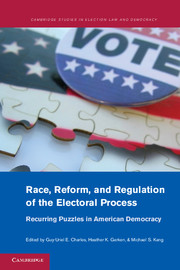Preface
Published online by Cambridge University Press: 01 June 2011
Summary
Fair elections are essential to our democracy. It is critical that current safeguards intended to ensure the integrity of the electoral process evolve to meet the challenges posed by rapid social and economic changes – from rising ethnic diversity and economic inequality to the growing scale of campaign funding. To ensure that our democratic institutions satisfy America's current needs, academic experts and policy practitioners must have a clear understanding of how our elections function, how the obstacles to informed participation are evolving, and how judicial and legislative reform can best foster healthy democracy. Race, Reform, and Regulation of the Electoral Process presents the best contemporary research on these questions and charts an agenda for the next generation of scholarship on elections and democracy.
The scholars who contributed to this volume are part of the Tobin Project network of leading academics and policy makers committed to cultivating transformative, interdisciplinary research to address the most important problems for the long-term health, prosperity, and stability of American democracy. This volume is a significant contribution toward that goal, and we are pleased to have played at least a small role in bringing the book to fruition.
The ideas presented here were first shared in February 2009 at a Tobin Project conference: “The Future of Election Law: Policy Challenges and a Research Agenda for Reform.”
- Type
- Chapter
- Information
- Race, Reform, and Regulation of the Electoral ProcessRecurring Puzzles in American Democracy, pp. xv - xviPublisher: Cambridge University PressPrint publication year: 2011



